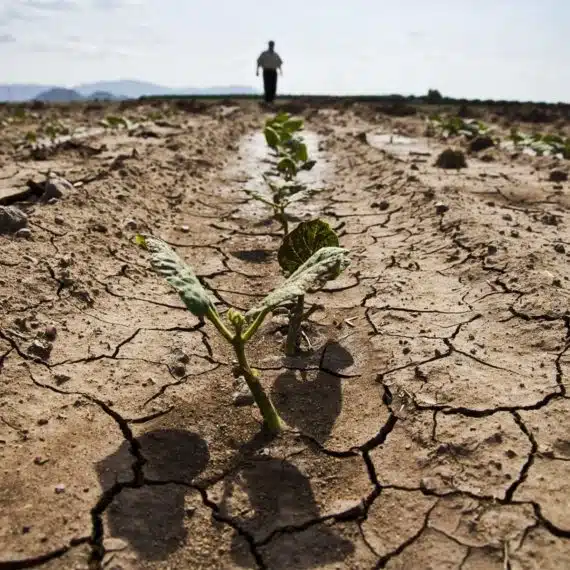“The soil is the ‘creative material’ of most of the basic needs of life. Creation starts with a handful of dust.”
Dr William A. Albrecht
Dr William Albrecht was a man ahead of his time. A good twenty years before the phrase ‘environmental concern’ crept into the USA’s national consciousness, Dr Albrecht was lecturing from coast to coast on the broad topic of agricultural ecology. Born in 1888, Dr Albrecht served as emeritus professor of soils and Chairman of the Department of Soils at the University of Missouri, as well as President of the Soil Science Society of America before his death in 1974.
Albrecht was also a prominent authority on the relation of soil fertility to human health. In 1961, he wrote: “Man and His Habitat – Wastebasket of the Earth”, published in the Bulletin of the Atomic Scientists. In this blog post, we summarise some of his beliefs and ideas.
The role of the soil
Albrecht starts his report as follows: “Contamination in the food we eat, the water we drink, and the air we breathe suggests a close connection with the soil.”
Albrecht refers to the soil as the “wastebasket” of the Earth, where all matter that has once lived and moved is disposed of through processes such as:
Oxidation
Reduction
Hydration
Hydrolysis
Molecular rearrangement.
These transformations create, nourish, protect and maintain all living creatures, including man.
… And how man disrupts it
“Man is upsetting much of the natural environment by his contamination of the air, the water, and particularly the soil, reducing its ability to dispose of wastes safely, and to nourish healthy populations of man and all living things.”
Albrecht argues that the way in which humans manage agricultural crops and livestock is not based on knowledge of the limitations of soil fertility, nor by knowledge of the appropriate climatic and geologic settings required to maintain a natural balance. Essentially, by transplanting species out of their natural habitats and farming them intensively, humans have rapidly depleted the quality of the soil – soil that is vital to the growth and health of crops and livestock in the first place.
Disruption at all levels
As the Earth’s ‘transformer’, soil “is still the only energy supply on which all kinds of life depend.”
These populations can be split into:
Decomposers: various kinds of microbial life which live by degrading organic debris
Producers: plants that produce organic compounds carrying the chemicals and other energy transferred from the sun
Predators: prey upon plant populations and each other.
Here are some of the ways in which each ‘level’ is affected by human activity.
Decomposers
Decomposers turn organic materials into fossil fuels of organic origin, accumulated slowly at great depths below the Earth’s surface. When these remnants are brought into the atmosphere and turned into products such as antiseptics, pesticides and herbicides, “they are the most extensive and powerful biochemical contaminations we have yet known” and “their range of disturbances covers the entire biotic pyramid”.
Producers
Along with decomposers, producers determine the environmental support of all other populations. However, since plants root themselves in the soil and extend above-ground into the atmosphere, they are vulnerable to contaminants from both directions. Their health is directly dependent on the nutrient availability in the soil and the environmental conditions to which they are exposed. Human interventions such as excessive use of chemical salts in fertilisers can upset plant nutrition.
Predators
In natural environments, the numbers of predators are directly controlled by the availability of prey or producers. With human technological advancements, however, we break the law of predator-prey relations. As we grow in population size, the soil loses its ability to grow the vegetation of nutrition in the required quality and quantity, leading to serious human health effects.
Man as the contaminant
Albrecht characterises humankind as “the main biological liability, not only to himself, but to the other populations supporting him.”
According to Albrecht, it is our disregard of ecological limitations, creation of monoculture and chemicalised agricultures, attempts to control the natural environment according to the dictates and technology and economics, and disregard of nature’s laws that will lead to our demise. In his sobering conclusion, he wrote: “In all probability, nature, not he, will determine the final outcome.”
A sustainable approach to soil health
Albrecht wrote: “We are exhausting the quality of our soils. As we do so, the quality of our plants goes down. And we are accepting this.”
At Zylem, we do not accept this approach. Our primary objective is to implement cost-effective farming practices that support the soil and produce healthier, more nutrient-dense crops, dairy and livestock.
Using a consultative approach, we offer a range of biological foliar and soil conditioners that support sustainable agriculture, the foundation of “farming for our future”.
Find out more about our services and solutions.

About the Author: Alex Platt
Alex is Business Development Manager at Zylem. He’s inspired by the potential of regenerative farming and takes a special interest in the technology and products that are moving agriculture in a more sustainable direction.

